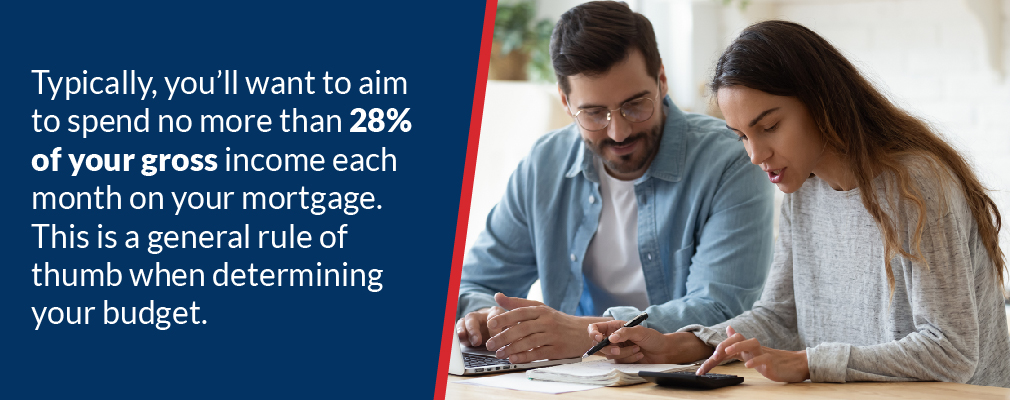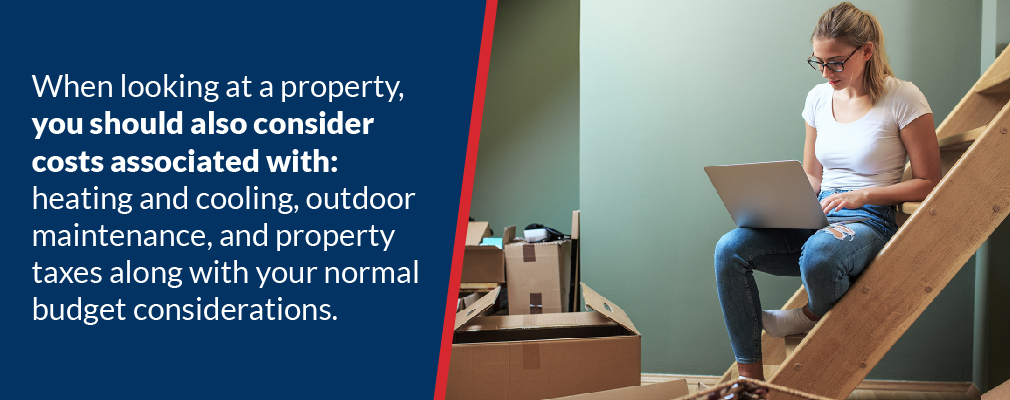Whether you’re shopping for your first home or your next one, it’s important to establish a budget before you start looking. By the end of 2021, the median home price in the U.S. was just over $400,000. In Virginia it’s $348,835 and in North Carolina, $282,312. Of course, you may be looking at a budget that’s lower or higher than that median figure. In this article, we’ll focus on figuring out how much house you can afford and how much you should have saved to cover expenses after you’ve moved into your home.

Review your current savings and budget
How much do you already have saved for a down payment on your home purchase? If you already own a home, you can use the profit from selling it to put money down on your next house. Otherwise, you’ll need to come up with a down payment from some combination of savings, gift money, or Homebuyers assistance programs.
While 20% is the gold standard of down payments, it’s possible to put down less. For example, AMNB offers VA, FHA & USDA Home Loans with a variety of down payment options depending on your eligibility. Virginia Housing has a Down Payment Assistance grant for first-time homebuyers who meet certain criteria. The North Carolina Housing Finance Agency offers a 0% deferred second mortgage for down payment costs to qualifying first-time home buyers and military veterans. Finally, some home buyers receive gift money from parents or grandparents to put toward a down payment.
The important thing when figuring out how much house you can afford is to not spend your entire savings on a down payment. You should have money in reserve for home repairs and other surprise expenses. And you don’t want to end up “house poor” with a monthly mortgage payment (including taxes and insurance) that squeezes your budget too tightly.
Debt-to-income (DTI) ratio
Your DTI is the percentage of your monthly income that goes toward debt payments such as rent or mortgage payment, alimony or child support payments, student and auto loans, credit card payments, and other debts.
To calculate your DTI, add your monthly debt payments and divide the total by your gross monthly income. 35% or less is considered good, so if yours is higher than that, you may want to consider paying down some debt before applying for a mortgage.
How much house can you afford?
Once you’ve done your own calculations to determine how much you can afford to spend on a home, it’s time to get pre-approved for a mortgage loan. Talking to a local lender about the best mortgage loan options for you and seeing how much you can potentially borrow is very helpful. Keep in mind that you don’t have to borrow the full amount you’re pre-approved for. Keep your monthly budget in mind so you don’t end up with a higher-than-comfortable housing payment.
Common Expenses For Homeowners
As mentioned, budgeting for buying a home should include saving for unexpected and recurring expenses such as:
- Initial decorating and repairs such as painting and furniture or appliance purchases
- Gutter cleaning
- Lawn Care
- Appliance replacement
- Roofing and HVAC repairs
- Plumbing and electrical work
Your Hometown Mortgage Lenders
At American National Bank & Trust Company, we believe being local is more than just having an office in your Virginia or North Carolina community. It’s about looking out for our customers with better banking options and quick, local decisions. Schedule an appointment today for a complimentary quote or a pre-approval! Have questions? Contact a member of our local mortgage lending team today. First-time homebuyer? Check out our “Ultimate Guide For First-Time Homebuyers in VA & NC.”


